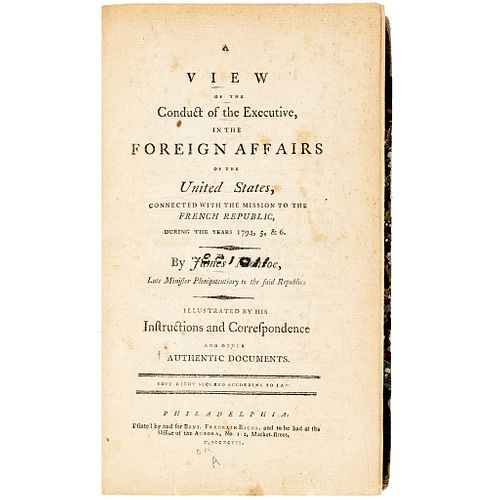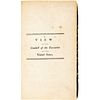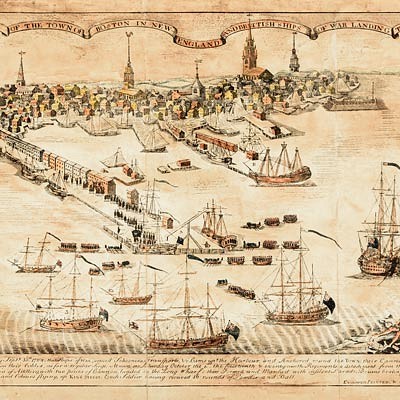1798 James Monroe Defense of his Mission to the French Republic 1794 to 1796
Lot 209
Categories
Estimate:
$600 - $700
Absentee vs Live bid
Two ways to bid:
- Leave a max absentee bid and the platform will bid on your behalf up to your maximum bid during the live auction.
- Bid live during the auction and your bids will be submitted real-time to the auctioneer.
Bid Increments
| Price | Bid Increment |
|---|---|
| $0 | $10 |
| $200 | $20 |
| $300 | $25 |
| $500 | $50 |
| $1,000 | $100 |
| $2,000 | $200 |
| $3,000 | $250 |
| $5,000 | $500 |
| $10,000 | $1,000 |
| $20,000 | $2,000 |
| $30,000 | $2,500 |
| $50,000 | $5,000 |
| $100,000 | $10,000 |
| $200,000 | $20,000 |
| $300,000 | $25,000 |
| $500,000 | $50,000 |
About Auction
By Early American History Auctions
Mar 20, 2021
Set Reminder
2021-03-20 12:00:00
2021-03-20 12:00:00
America/New_York
Bidsquare
Bidsquare : Autographs-Colonial-Political-Americana
https://www.bidsquare.com/auctions/early-american-history-auctions/autographs-colonial-political-americana-6509
330 Lots of Rare, Historic Autographs, Americana, Civil War Era, George Washington, Abraham Lincoln, Slavery & Black History, Revolutionary War Era, Colonial America, Federal Period, War of 1812, Colonial Currency, Indian Peace Medals & more... Early American History Auctions auctions@earlyamerican.com
330 Lots of Rare, Historic Autographs, Americana, Civil War Era, George Washington, Abraham Lincoln, Slavery & Black History, Revolutionary War Era, Colonial America, Federal Period, War of 1812, Colonial Currency, Indian Peace Medals & more... Early American History Auctions auctions@earlyamerican.com
- Lot Description
Federal Period
1798 Rare Book: James Monroe's Defense of his... "Mission to the French Republic During the Years 1794, 5, and 6"
1798-Dated Federal Period Rare First Edition, Hardcover Book titled, "A View of the Conduct of the Executive, in the Foreign Affairs of the United States, Connected with the Mission to the French Republic During the Years 1794, 5, and 6" by James Monroe, (Philadelphia)," Fine.
This 405 page book has been rebound with marbled paper boards to an overall size of 8.5" x 5.5". The cloth spine has been hand-lettered in white ink by the Library of Grand Rapids, Michigan, from whence this book was deacquisitioned. The pages are all moderately and uniformly toned and they are in generally good condition. Library stamping show-through to the title page and has a few handwritten, penciled notes.
In 1794, James Monroe was appointed minister to France by President Washington and Secretary of State Randolph; however he quickly found himself in trouble with the administration. Jay's Treaty with England failed to protect Monroe against criticism from France. Despite being an avid supporter of France, Monroe lost that nation's confidence and was recalled by the new Secretary of State, Pickering, in 1796. Once arriving at home, he wrote this book as vindication of his conduct. A fascinating personal defense on the behalf of Monroe.
James Monroe (April 28, 1758 - July 4, 1831) was an American statesman, lawyer, diplomat and Founding Father who served as the fifth president of the United States from 1817 to 1825. A member of the Democratic-Republican Party, Monroe was the last president of the Virginia dynasty; his presidency coincided with the Era of Good Feelings.
He is perhaps best known for issuing the Monroe Doctrine, a policy of opposing European colonialism in the Americas. He also served as the governor of Virginia, a member of the United States Senate, the U.S. ambassador to France and Britain, the seventh Secretary of State, and the eighth Secretary of War.
Born into a planter family in Westmoreland County, Virginia, Monroe served in the Continental Army during the American Revolutionary War. After studying law under Thomas Jefferson from 1780 to 1783, he served as a delegate in the Continental Congress. As a delegate to the Virginia Ratifying Convention, Monroe opposed the ratification of the United States Constitution. In 1790, he won election to the Senate, where he became a leader of the Democratic-Republican Party. He left the Senate in 1794 to serve as President George Washington's ambassador to France, but was recalled by Washington in 1796. Monroe won election as Governor of Virginia in 1799 and strongly supported Jefferson's candidacy in the 1800 presidential election.
As President Jefferson's special envoy, Monroe helped negotiate the Louisiana Purchase, through which the United States nearly doubled in size. Monroe fell out with his longtime friend James Madison after Madison rejected the Monroe"Pinkney Treaty that Monroe negotiated with Britain. He unsuccessfully challenged Madison in the 1808 presidential election, but in April 1811 he joined Madison's administration as Secretary of State. During the later stages of the War of 1812, Monroe simultaneously served as Madison's Secretary of State and Secretary of War. His wartime leadership established him as Madison's heir apparent, and he easily defeated Federalist Party candidate Rufus King in the 1816 presidential election.
Monroe's presidency was coterminous with the Era of Good Feelings, as the Federalist Party collapsed as a national political force. As president, Monroe signed the Missouri Compromise, which admitted Missouri as a slave state and banned slavery from territories north of the parallel 3630' north. In foreign affairs, Monroe and Secretary of State John Quincy Adams favored a policy of conciliation with Britain and a policy of expansionism against the Spanish Empire. In the 1819 Adams-Onis Treaty with Spain, the United States secured Florida and established its western border with New Spain.
In 1823, Monroe announced the United States' opposition to any European intervention in the recently independent countries of the Americas with the Monroe Doctrine, which became a landmark in American foreign policy.
Monroe was a member of the American Colonization Society, which supported the colonization of Africa by freed Slaves, and Liberia's capital of Monrovia is named in his honor. Following his retirement in 1825, Monroe was plagued by financial difficulties, and died on July 4, 1831 in New York City. He has been generally ranked as an above-average President by historians.
Our Auction Contents:
Black History & Slavery: (Lots 1 - 63)
Abraham Lincoln Related: (Lots 64 - 74)
Historic Autographs: (Lots 75 - 235)
Colonial America: (Lots 236 - 261)
Revolutionary War: (Lots 262 - 304)
George Washington Related: (Lots 305 - 306)
Early American Guns & Weapons: (Lots 307 - 318) - Shipping Info
-
Early American provides in-house worldwide shipping. Please contact us directly if you have questions about your specific shipping requirements.
-
- Buyer's Premium



 EUR
EUR CAD
CAD AUD
AUD GBP
GBP MXN
MXN HKD
HKD CNY
CNY MYR
MYR SEK
SEK SGD
SGD CHF
CHF THB
THB














